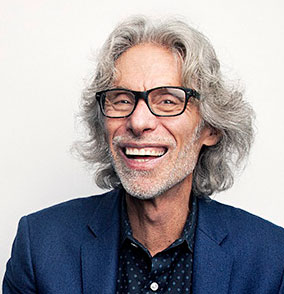 “Even before the pandemic, it was clear we needed to reimagine how we engage. Humor was the answer.”
“Even before the pandemic, it was clear we needed to reimagine how we engage. Humor was the answer.”
Do you ever face tricky situations on the job communicating and collaborating with others? Whether you work for a small not-for-profit, big business, or anything in between, if you’re interested in teamwork and creative problem solving, then this Facebook Live video is for you.
On September 24th I talked with researcher, humanitarian, and game designer Pablo Suarez about how cartoon humor can help organizations improve communication.

Pablo Suarez
No one understands the challenges faced by large organizations like Pablo Suarez. As innovation lead at the Red Cross Red Crescent Climate Centre and Senior Fellow at the Adrienne Arsht-Rockefeller Foundation Resilience Center, every day, Suarez brings people from around the world together to solve global problems. Finding common ground across cultures while diffusing finger-pointing isn’t easy.
According to Pablo, “Even before the pandemic, it was clear that we needed to reimagine how we engage.”
As a game designer, thinking creatively comes naturally to Pablo. As a humanitarian, Suarez used that same outside-the-box thinking to develop a new way to approach these challenges. How? By introducing an unexpected tool: cartoons.
Pablo has been the driving force behind the creation of Cartoonathons: live, interactive, humor-driven events designed to help organizations worldwide solve global problems through the power of humor.
 Cartoonathons bring together the creative minds and talents of New Yorker cartoonists and thought leaders from around the world focused on tackling large-scale issues to think through these problems in a completely new way. As the organizations work together and share concerns, cartoonists can reveal points of friction they hear just below the surface, leading to better solutions.
Cartoonathons bring together the creative minds and talents of New Yorker cartoonists and thought leaders from around the world focused on tackling large-scale issues to think through these problems in a completely new way. As the organizations work together and share concerns, cartoonists can reveal points of friction they hear just below the surface, leading to better solutions.
But why cartoons? When Pablo and I met, he’d been trotting the world, creating unconventional ways to communicate changing global risks with local consequences, working with artists, game designers, chefs, and was curious about humor as a tool for disaster management. Could humor help accomplish humanitarian goals? In addition to being a cartoonist and cartoon editor of The New Yorker, I had long been exploring the science of humor and giving talks on the topic around the country. When a common acquaintance finally brought Pablo and me together, it was a eureka moment! Pablo explained his playful approach to running serious events. I explained what’s wrong with the world through cartoons — and how humor can help … and the Cartoonathon was born.
“I’ve found that humor helps to dissolve denial,” Pablo explains. “Cartoons invite us to recognize reality as ridiculous, inexcusable, requiring change. Once armed with that irrefutable awareness, it’s easier for teams to reflect and discuss candidly what’s really going on; and most importantly, what to do about it.”
For over three years, Pablo and I, with our team at CartoonCollections, have embarked on exciting serious-but-fun endeavors for the Red Cross, the World Bank, the BMW Foundation, Harvard University, and others, exploring problems ranging from rising sea level to anti-racism, and from insurance to “bullshit.” And it feels like this is just the beginning.
Watch our Facebook Live conversation.
Learn more about Cartoonathons.
Read more from Pablo Suarez on How to Use Humor to Drive Insights.
Pablo Suarez is innovation lead at the Red Cross Red Crescent Climate Centre, as well as visiting fellow at Boston University, and artist in residence at the National University of Singapore. He has consulted for the United Nations Development Programme, the World Bank, Oxfam, and about twenty other international humanitarian and development organizations, working in more than 60 countries. His current work involves creative approaches to climate risk management – ranging from self-learning algorithms for flood prediction to collaboration with humorists to inspire thinking and action. Pablo holds a water engineering degree, a master’s degree in planning, and a Ph.D. in geography.

